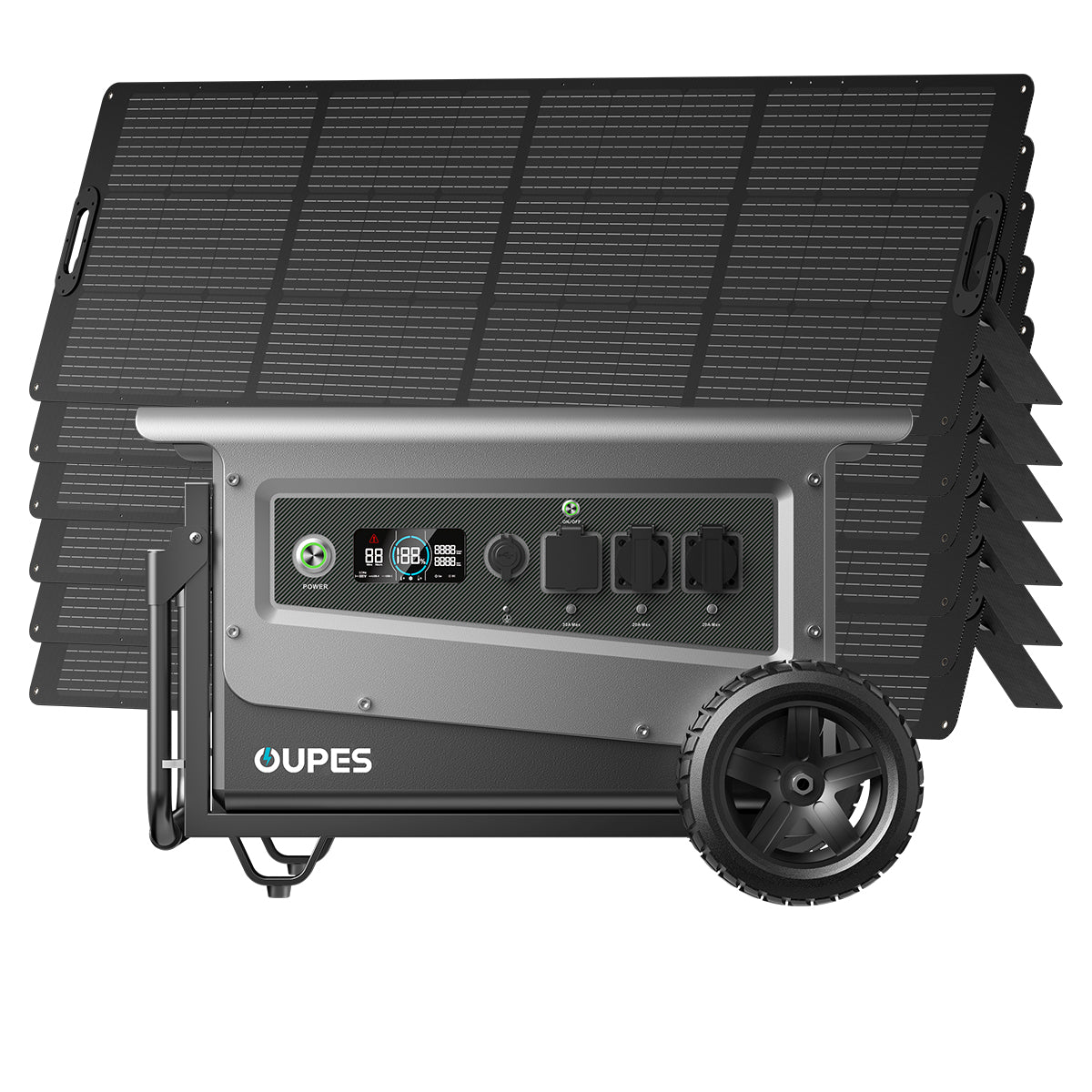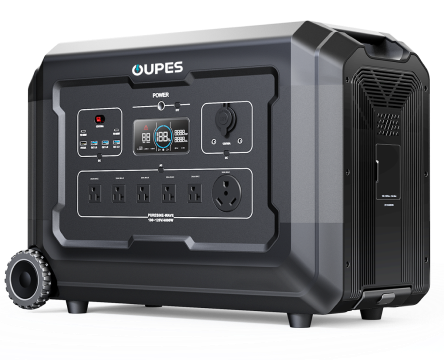
Have you ever experienced a power outage and worried about your food going bad in the fridge? Or maybe you're planning an off-grid camping trip and want to keep your perishables cold. In both situations, a solar generator can be a game-changer. But just how long will a solar generator power a refrigerator?
This question is more common than you think—and the answer depends on several key factors. In this article, we’ll break down everything you need to know about powering a refrigerator with a solar generator. From understanding your fridge’s power draw to maximizing battery efficiency, this guide is designed to help you get the most out of your solar setup.
Understanding Refrigerator Power Requirements
Before you can determine how long a solar generator will run a refrigerator, it’s essential to understand how much power your refrigerator consumes. Most household refrigerators operate within a range of 100 to 800 watts, depending on their size, efficiency, and age. Modern energy-efficient models tend to use less power, while older or larger units consume more.
Refrigerators typically cycle on and off throughout the day. Instead of running continuously, they operate intermittently to maintain a consistent internal temperature. This cycling behavior is referred to as the duty cycle. For most residential refrigerators, the duty cycle ranges from 30% to 50%. That means a 150-watt refrigerator may only draw power for 8 to 12 hours out of every 24-hour period.
To calculate daily energy consumption, you can multiply the running wattage by the estimated hours of operation. For example, if your refrigerator uses 150 watts and operates for 10 hours a day, it would consume about 1,500 watt-hours (1.5 kWh) daily. This calculation provides a baseline for matching your refrigerator with the appropriate solar generator capacity.
It’s also important to consider the startup surge power. When a refrigerator compressor kicks in, it can briefly draw two to three times its normal running wattage. Your solar generator must be capable of handling this surge to prevent overloading or system shutdowns. Many quality solar generators include surge capacity ratings to accommodate such appliances.
Understanding your refrigerator's energy demands helps you select the right solar generator and estimate realistic runtimes under typical usage conditions.
Choosing the Right Solar Generator for Refrigerators
Not all solar generators are built the same, and choosing the right one for your refrigerator is critical to performance. The key specifications to focus on are battery capacity, inverter rating, and surge power handling.
Battery capacity is typically measured in watt-hours (Wh). This value indicates how much energy the generator can store and supply. To power a refrigerator that consumes 1,500Wh per day, your solar generator needs at least that much storage—ideally more to account for inefficiencies and overcast conditions. A generator with a 2000Wh capacity, for example, could run a mid-sized refrigerator for roughly 24-30 hours without recharging.
The inverter rating tells you how much continuous power the generator can deliver. If your fridge draws 150 watts during operation, a solar generator with a 300-watt inverter will suffice. However, to be safe, choose a model with at least double your fridge’s average wattage. This ensures smooth operation and room for other devices if needed.
Surge power capacity is equally important. As mentioned earlier, refrigerators can demand 2-3x their running wattage when starting. A solar generator with insufficient surge capacity may trip or fail during startup. Always check the surge power specs and match them to your refrigerator’s startup load (often listed on the appliance or in the manual).
Some top-tier solar generators offer expandable batteries or modular systems, which are great if you plan to power additional devices or extend runtimes. Others integrate MPPT charge controllers, which improve solar charging efficiency and reduce downtime between uses.
When choosing a solar generator, aim for one with at least 1.5x to 2x the expected daily power requirement of your refrigerator. This margin accounts for real-world variability and ensures reliable performance in emergencies or off-grid setups.
How Long Will a Solar Generator Power a Refrigerator?
The actual runtime of a refrigerator powered by a solar generator depends on several variables: the generator’s capacity, the fridge’s power consumption, and environmental conditions affecting solar input. That said, we can estimate average runtimes using real-world examples.
Let’s say you have a 150-watt refrigerator with a 50% duty cycle, meaning it runs about 12 hours a day. Its daily energy requirement is 150W x 12h = 1,800Wh. If you pair this with a solar generator rated at 2000Wh, you can expect it to power the fridge for approximately 24-26 hours without needing a recharge.
Now consider a 1000Wh solar generator. Using the same fridge, it would provide around 12-13 hours of runtime. Keep in mind that this assumes the fridge cycles normally and isn’t placed in an extremely hot environment, which could increase its runtime and energy use.
If you're using solar panels to recharge the generator during the day, the system can run indefinitely—provided you generate enough power to offset the fridge's daily usage. For example, a 400-watt solar panel system receiving 5 hours of direct sunlight can generate around 2000Wh per day, enough to keep a typical refrigerator running continuously.
It’s also important to consider battery degradation over time. Lithium-ion batteries (common in solar generators) degrade slowly but will lose capacity with repeated cycles. High-quality generators, especially those with built-in battery management systems, can mitigate this effect and ensure consistent performance over years of use.
Ultimately, the more efficient your refrigerator and the higher your solar generator’s capacity, the longer you can run the appliance without interruption. Adding solar panels to the equation allows for longer runtimes and even perpetual usage in sunny environments.
Tips for Maximizing Solar Generator Runtime with Refrigerators
If you’re relying on a solar generator to power your refrigerator during a blackout or while off-grid, maximizing efficiency is key. Several strategies can extend runtime and reduce energy waste, helping you get the most out of your solar investment.
First, ensure your refrigerator is energy efficient. Newer ENERGY STAR-rated appliances use significantly less power than older models. If upgrading your refrigerator isn’t an option, regular maintenance—like cleaning coils and checking seals—can improve performance and reduce energy usage.
Next, reduce how often you open the fridge. Each time the door is opened, cold air escapes and warm air enters, forcing the compressor to work harder. Plan ahead and retrieve items quickly to minimize temperature fluctuations and compressor cycles.
Another tip is to keep the refrigerator well-stocked. A full fridge retains cold better than an empty one. If you don’t have enough food, use containers of water to fill space and stabilize the temperature.
During daylight hours, charge the solar generator using high-efficiency solar panels. Aim to place them in direct sunlight, angled optimally for your location and season. Using MPPT charge controllers enhances charging speed and ensures you make the most of available sunlight.
You can also reduce your refrigerator's runtime by adjusting the temperature settings. Most food stays safely preserved at 37–40°F (3–4°C). Avoid setting the fridge unnecessarily cold, which increases power consumption without added benefit.
Lastly, unplug other non-essential devices when the generator is powering your fridge. This preserves energy for your most critical appliance. Many solar generators include monitoring tools or companion apps—use these to track power usage and adjust accordingly.
Following these best practices can significantly increase your solar generator’s runtime, especially in emergency scenarios where every watt counts.
Real-Life Applications and Use Cases
Solar generators are more than just backup power—they're flexible, reliable tools for many practical scenarios. Knowing how long they can power a refrigerator reveals their value in real-world use cases.
In emergency preparedness, solar generators offer a lifeline during extended outages. Whether caused by hurricanes, wildfires, or grid failures, these devices can keep your refrigerator running for a full day or longer—helping preserve medication, food, and peace of mind. With a good solar panel setup, you can even recharge during daylight and maintain continuous operation throughout an outage.
Off-grid living is another area where solar generators excel. In cabins or tiny homes without traditional power lines, solar generators can provide essential energy for refrigeration. Depending on the system’s size and your energy habits, you can enjoy all the benefits of a modern fridge without relying on noisy gas generators or propane setups.
Outdoor adventures like camping or vanlife are also perfect for solar generators. Many RVers use solar setups to power 12V or mini fridges while traveling. These systems offer freedom from campgrounds and allow for quiet operation in remote locations. Portable solar panels and high-efficiency lithium batteries make mobile refrigeration sustainable and convenient.
Small businesses or mobile vendors—like food trucks or farmers markets—may use solar generators to run compact refrigerators, coolers, or drink dispensers. They provide clean, quiet energy without the noise or pollution of gas engines, which can be crucial in public or eco-conscious environments.
Solar generators are also popular in humanitarian efforts. In regions with limited grid access, NGOs use them to power medical fridges for vaccines or blood storage, ensuring proper preservation even in challenging conditions.
Whether you’re planning for emergencies, going off-grid, or simply looking for a quieter way to stay cool on the road, solar generators offer a flexible, reliable, and sustainable solution.
Conclusion: Making the Most of Your Solar Generator
So, how long will a solar generator power a refrigerator? The answer lies in understanding your refrigerator's energy usage, the capacity of your solar generator, and how efficiently you manage both. With the right setup, a mid-range solar generator can power a refrigerator for 24 hours or more—and with solar recharging, potentially indefinitely.
Solar generators offer reliable and eco-friendly power for refrigeration needs, whether you’re dealing with an outage, living off-grid, or traveling. By choosing the right equipment and following smart energy-saving practices, you can confidently keep your food safe and fresh—anywhere, anytime.




























